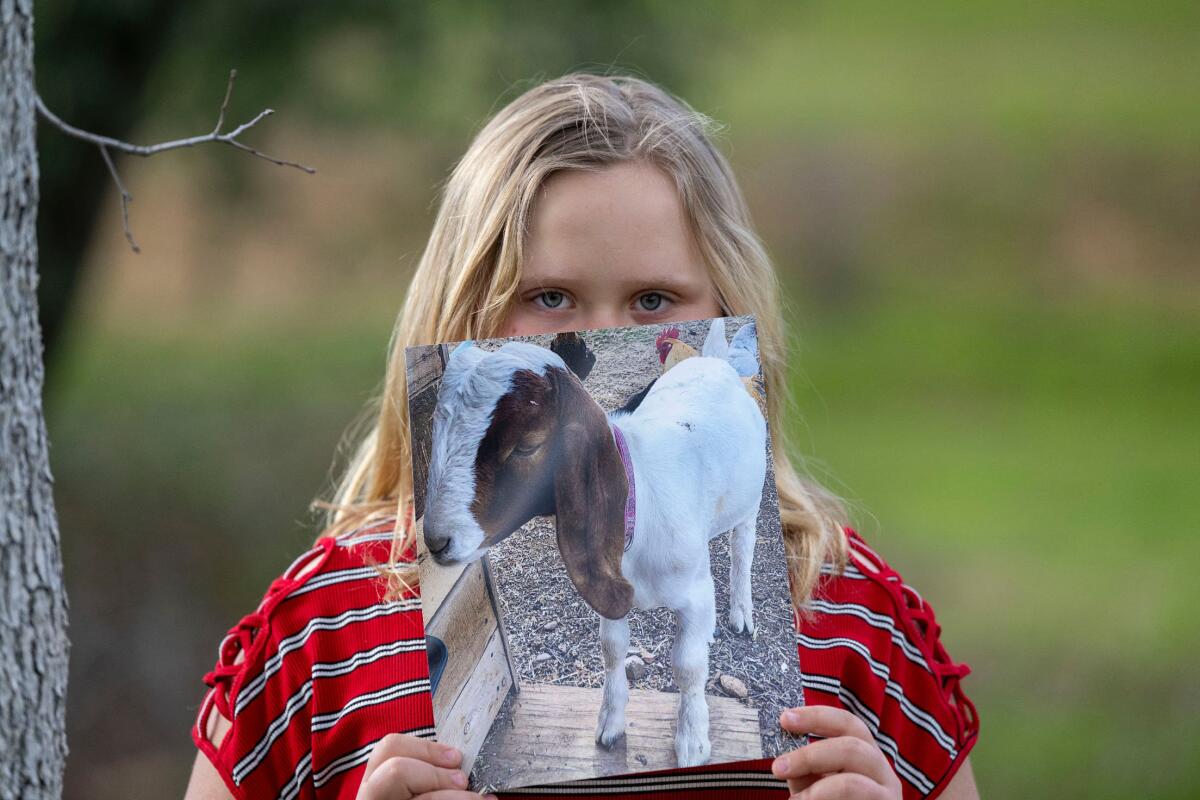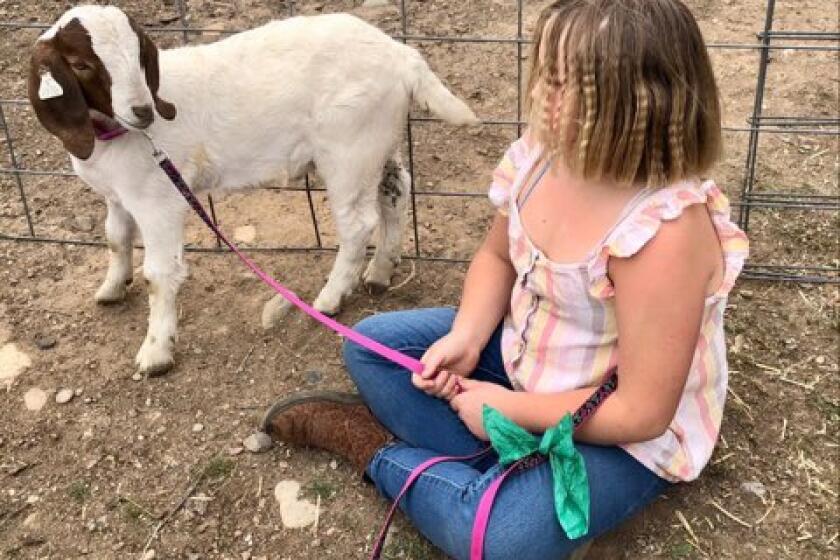A little girl’s family wants to know who slaughtered her pet goat. Shasta District Fair officials won’t say

- Share via
Nearly two years after a 9-year-old sobbed and pleaded that her pet goat, Cedar, not be sold and slaughtered for meat, Shasta District Fair officials still refuse to answer the question: Who killed the goat?
The fate of the white and brown goat became international news last year after the girl’s parents filed a federal lawsuit against the district fair. Jessica Long’s daughter had raised the goat to enter into the fair’s 4-H program, which teaches children about the process of raising and caring for livestock to provide food, as ranchers and farmers do. But before the animal was to be slaughtered, the young girl begged not to give up the goat that had become a beloved pet.
Long surreptitiously retrieved the goat from a barn at the fair, wrote to fair officials explaining the dilemma, and offered to pay for the goat and any expenses incurred from her daughter’s change of heart. Shasta District Fair officials refused and threatened that Long could be charged with grand theft because the animal had been sold at auction. Officials then reached out to the Shasta County Sheriff’s Office, which obtained a search warrant and sent deputies 500 miles across Northern California to find and seize the goat before the county barbecue.
The fight between Long and fair officials has since gone viral, grabbing international headlines. The story of Cedar the goat sparked a California bill that would allow kids to enter animals in county fairs without the risk of the animals being butchered. It’s sparked debate about the 4-H program, whether a child should be allowed to back out of it, and about officials’ decision to use law enforcement resources to seize the goat.
But what happened to Cedar? Who butchered the goat and who ended up with its meat? Most important, who gave the green light to kill the goat that had turned into a pet?
Fair officials at the center of the dispute have refused to shed light on the questions, according to court filings reviewed by The Times. Despite a year of subpoenas, depositions and wrangling in federal court, key details of Cedar ‘s fate remain a mystery.
A 9-year-old girl didn’t want her goat slaughtered. California fair officials sent deputies after it
Jessica Long’s 9-year-old didn’t want her goat, Cedar, to be slaughtered at the county fair. Officials sent deputies with a search warrant to get it back.
Text messages uncovered in the federal lawsuit suggest fair officials wanted to keep secret what happened to Cedar.
“Kathy said ok but no one needs to know about this,” B.J. Macfarlane, livestock manager for the Shasta Fair Assn., wrote on July 22, 2022, to Shasta Fair Chief Executive Melanie Silva. In the text exchanges, he references Kathie Muse, a 4-H volunteer and organizer for the county barbecue. “U me and Kathy are only ones. It got killed and donated to non profit if anyone asks.”
“We are a non profit 😳🤣🤣🤣,” Silva responded.
When asked by Long’s attorneys in depositions about the goat’s fate, Shasta District Fair officials have said they don’t know what happened, who took Cedar, or who authorized for the goat to be butchered. Instead, three officials at the center of the legal fight have pointed the finger at each other, the sheriff and the Shasta County district attorney’s office, with no clear answer as to what happened.
In court documents, Long’s attorneys argue that the question of who killed Cedar is more than just semantics. Law enforcement and fair officials were aware that Cedar was at the center of a property dispute between Long and fair officials while the goat was still alive, yet someone decided to kill the goat despite multiple notices that a lawsuit was coming to determine who owned the floppy eared creature.
During one deposition, attorneys asked Macfarlane whether Cedar had been given to another bidder in the livestock auction.
“Yes. Maybe. I believe that’s what happened,” he answered.
“Who would know for sure on that?” Long’s attorneys asked.
“I believe Melanie [Silva] would,” he said, according to court filings.
Commentary: Where’s the humanity? Shasta fair chose to slaughter a girl’s goat to teach her a lesson
A young girl begged Shasta County fair officials to let her take her goat out of a slaughter auction, but they refused.
But attorneys would get little clarity from that lead.
“Where did it physically go?” attorneys asked Silva during her deposition.
“I don’t know,” she said.
Who knew, attorneys asked.
“Kathie Muse,” she said.
“I don’t know what happened,” Muse told attorneys, according to court filings.
“My understanding what I was told was he went back to somebody that had a problem with another goat that had been butchered,” she said in a deposition, according to court filings. “So we, in turn, replaced Cedar with that goat.”
The attorney then asked who would know what happened to Cedar.
“Probably Melanie [Silva],” she answered.
Macfarlane, Silva and Muse did not respond to messages seeking comment for this story.
If kids are going to take any part in the slaughtering of animals for food, adults needs to protect them from the pain they will feel.
In an email, Ryan Gordon, an attorney for Advancing Law for Animals who represents Long in the federal lawsuit, said that “critical deposition testimony in this case [is] either inconsistent between defendants, contradicted by phone records and texts, or later retracted.” He declined to discuss the ongoing case on the record further, other than to say that discovery was continuing.
Even though deputies seized Cedar on July 8, 2022, attorneys believe the goat was alive for weeks afterwards. Macfarlane is believed to have taken the goat from deputies, even as officials tried to decide what to do next. Meanwhile, Long and her attorneys were already reaching out to county officials trying to find Cedar.
“Talked to sheriff and he said to wait until he talks to DA before we kill goat,” Macfarlane texted Muse on July 11, 2022.
Court records indicate that on July 28, he texted Silva: “Goat is getting butchered within the half hour. Finally.”
He also texted Muse: “Bowman is killing goat today finally,” referring to a nearby butcher.
In a deposition, Macfarlane testified that Bowman Meats took the goat, and was told Vista Real Estate was given Cedar’s meat.
But owners of the two companies have denied being involved. Serene Nehls, co-owner of Bowman Meats in Cottonwood, told The Sacramento Bee that her shop was not involved. Instead, she said, a slaughterer told her the goat he killed at Macfarlane’s was black and white, not white and brown like Cedar.
Nehls, who did not respond to messages seeking comment, told the Bee that she gave Long’s attorney a written statement about a goat taken from Macfarlane’s home. That goat, she said, went to Vista Real Estate to replace another goat that was found to be “inadequate.”
The legal battle over a 9-year-old’s goat that was slaughtered after her family backed out of the Shasta District Fair continues with the state’s countersuit.
Chad Phillips of Vista Real Estate told The Times that he purchased a black and white goat at the fair to support a friend’s daughter who was also involved in the 4-H program. After such a purchase, the goat would be butchered and the cuts of meat delivered to the buyer.
That black and white goat, he said, was named Loin.
When asked about Cedar, he said, “I didn’t even buy that goat.”
Phillips said he has been subpoened for records about his purchase of the goat and the meat he received from it, but doesn’t plan to respond unless he gets a court order.
There’s no way to tell for sure what goat his meat came from, he said — “It shows up in white wrapping and labeled, ‘loin’ and ‘shoulder.’” But he knows he paid about $670 for a different goat at the fair, not Cedar.
In the meantime, attorneys for Long are seeking a court order asking for additional call and text records from Verizon, arguing in court filings that “neither Ms. Silva, Mr. Macfarlane, nor Mrs. Muse have offered any credible testimony as to who greenlit Cedar’s death.”
If testimony won’t bring clarity as to who killed Cedar, attorneys argue, perhaps phone records will.
More to Read
Sign up for Essential California
The most important California stories and recommendations in your inbox every morning.
You may occasionally receive promotional content from the Los Angeles Times.













